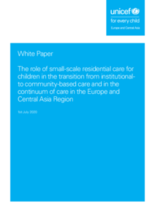The first waves of child care reforms in the Europe and Central Asia (‘ECA’) region were based on one simple, clear and evidence-based argument: children should never be ‘warehoused’ in large institutions and are best raised in families and within communities. After over 20 years of efforts to transform large-scale institutions in the region into family and community-based care settings, a new and important discussion has emerged that focuses on two core questions:
- Is residential care, under certain conditions, an appropriate form of communitybased care?
- If so, what balance should be struck between residential care and other forms of care such as foster care, kafalah, kinship and (transition to) adoption within a comprehensive child care and protection system?
The White Paper summarizes evidence on the current use and impact of small-scale residential care (also: ‘SSRC’) and offers guidance on how to enable all children to grow up in a loving and stable family environment. It aims to promote better decisionmaking among policy-makers, local governments, non-governmental organizations (NGOs), as well as child welfare and other, allied practitioners of the establishment.

